Unit 6 Outdoor fun Grammar 课件(共31张PPT)2023-2024学年牛津译林版七年级英语下册
文档属性
| 名称 | Unit 6 Outdoor fun Grammar 课件(共31张PPT)2023-2024学年牛津译林版七年级英语下册 | 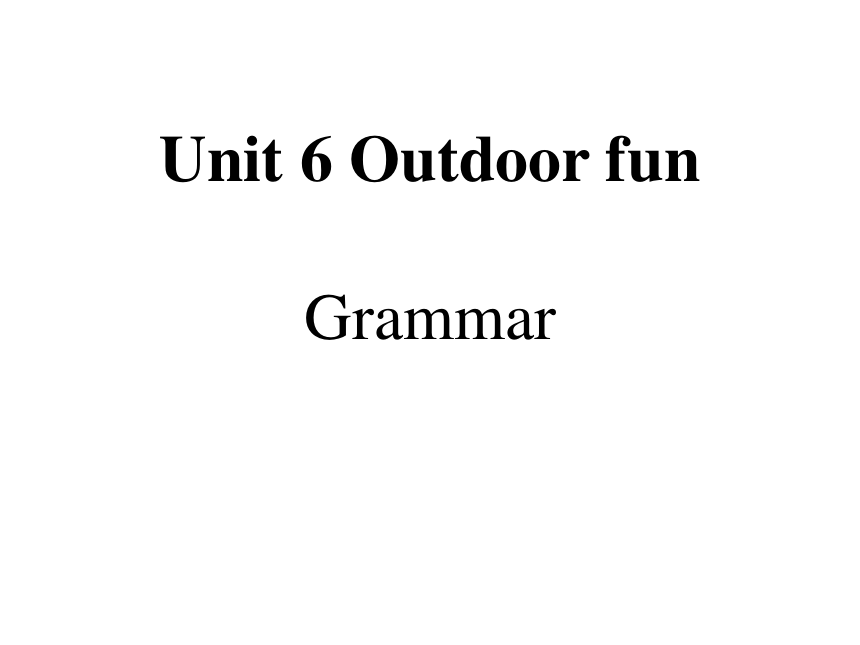 | |
| 格式 | pptx | ||
| 文件大小 | 6.8MB | ||
| 资源类型 | 教案 | ||
| 版本资源 | 牛津译林版 | ||
| 科目 | 英语 | ||
| 更新时间 | 2024-05-16 09:30:04 | ||
图片预览

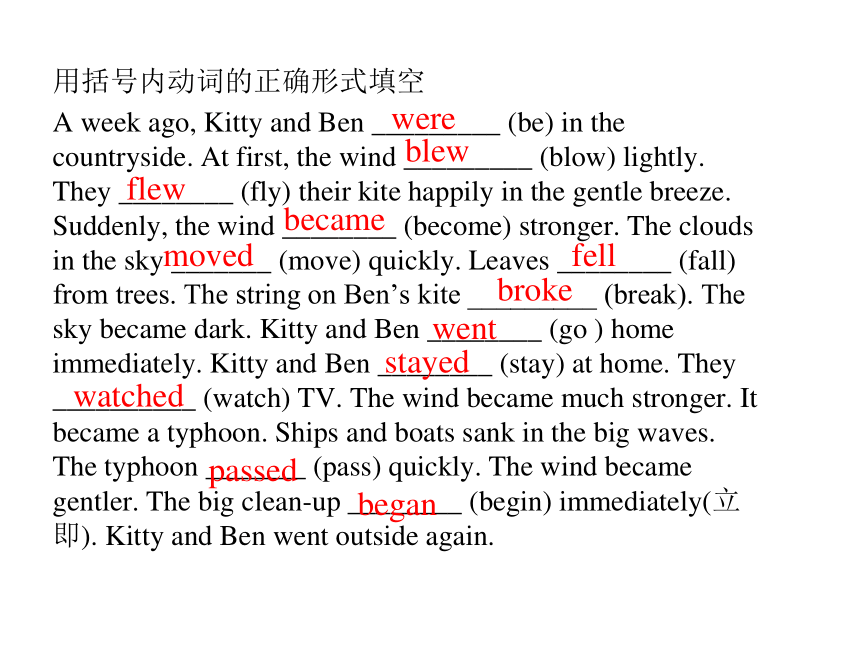
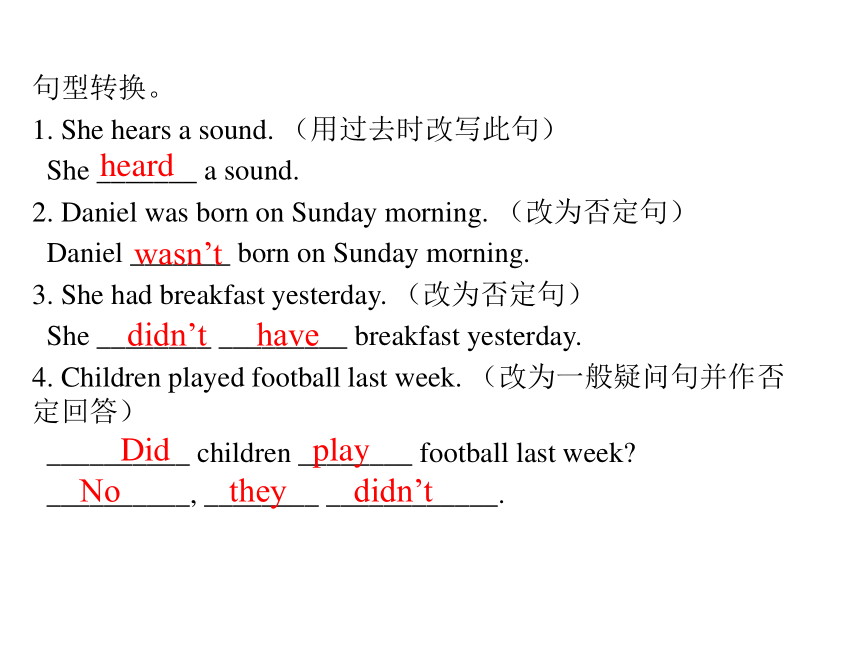
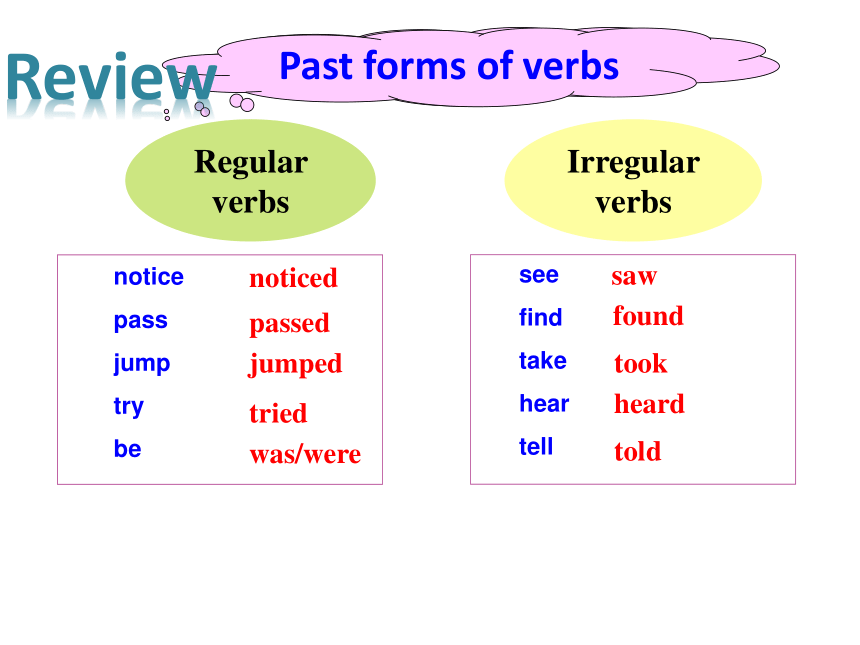
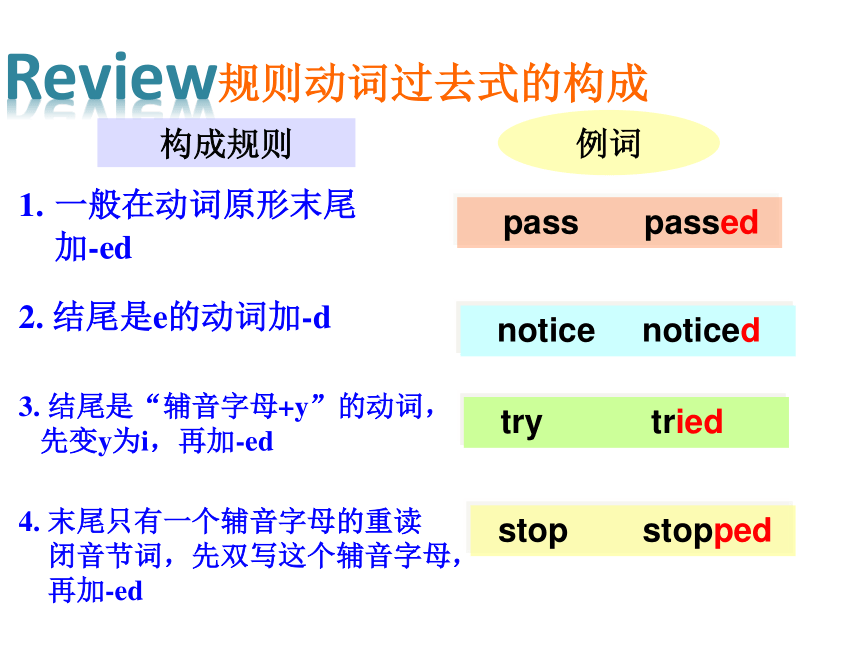
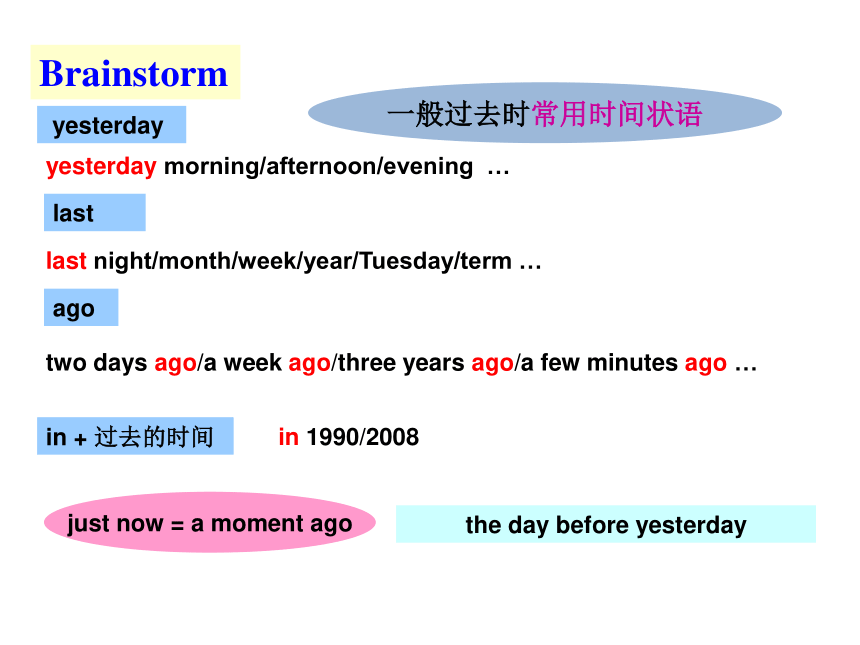
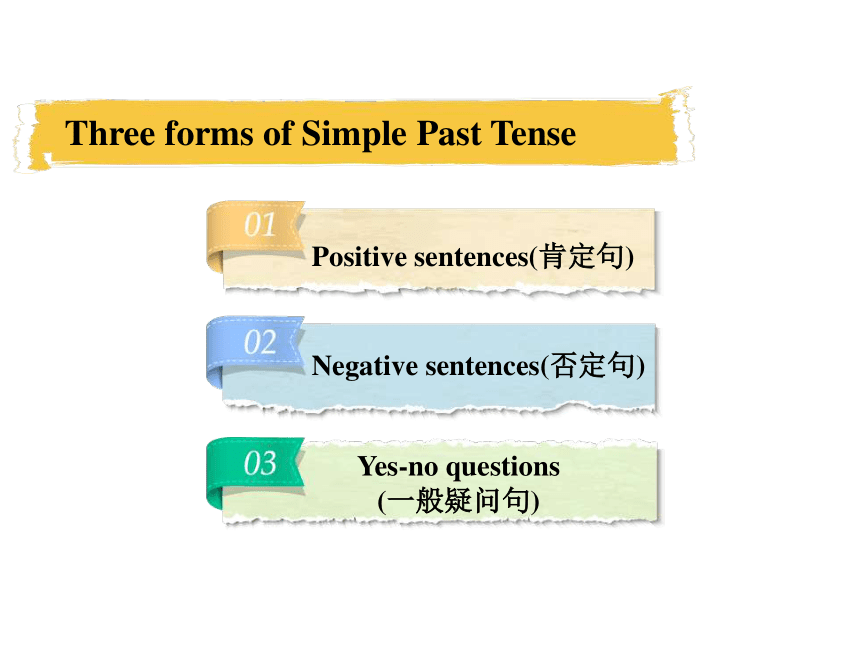
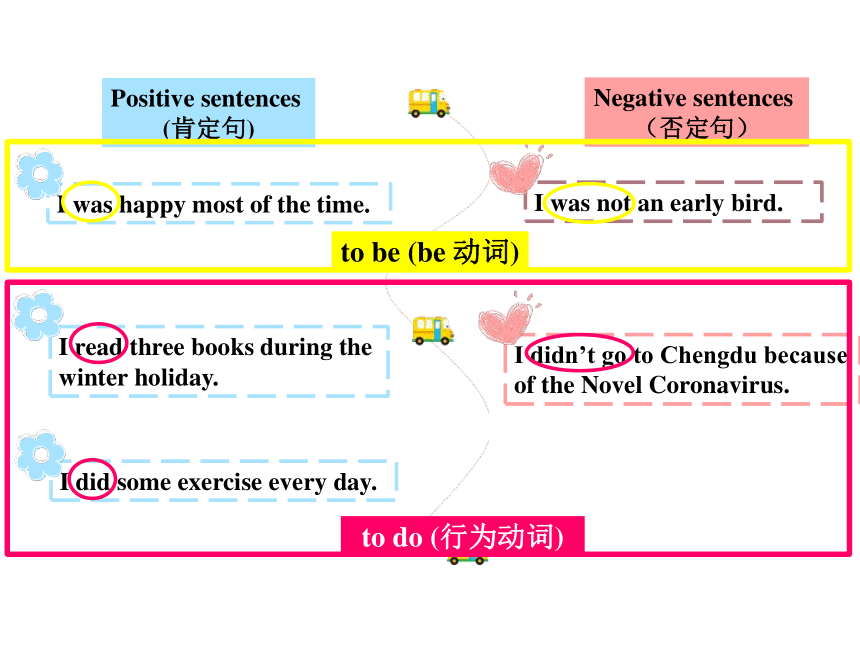
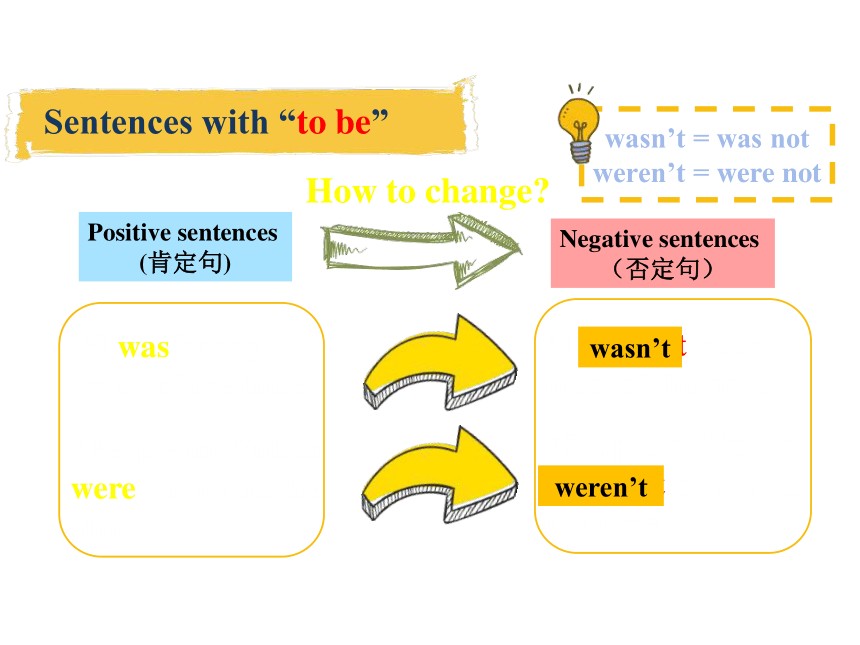
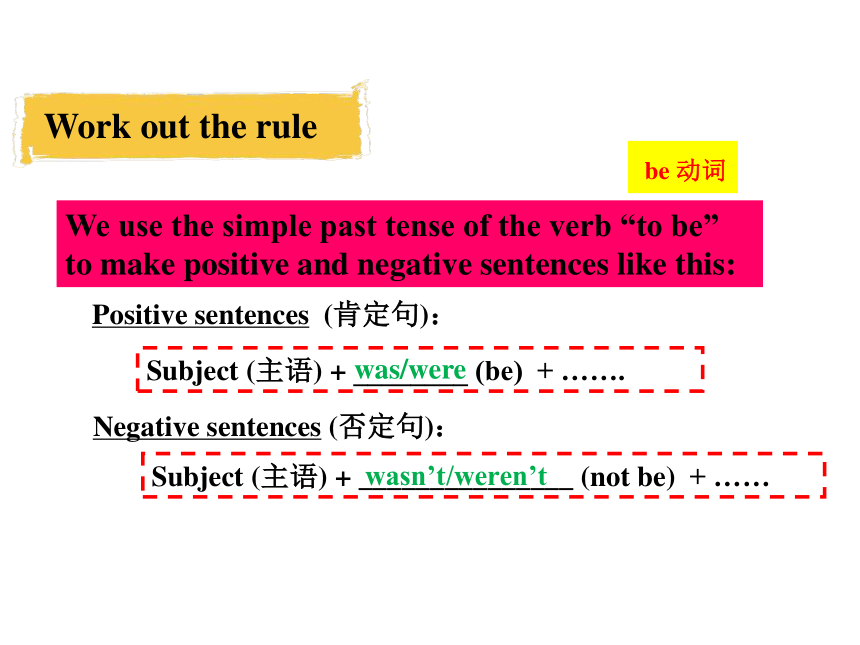
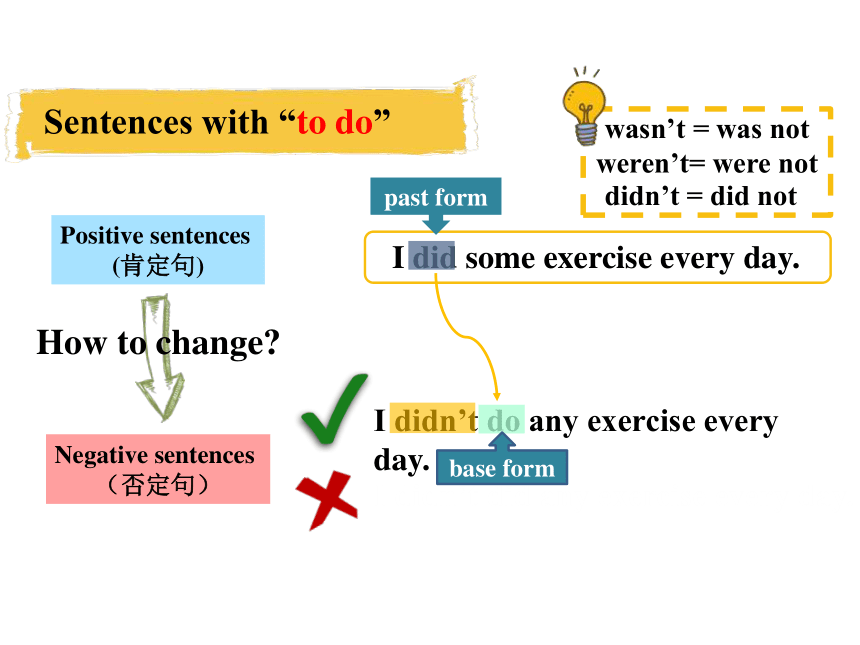
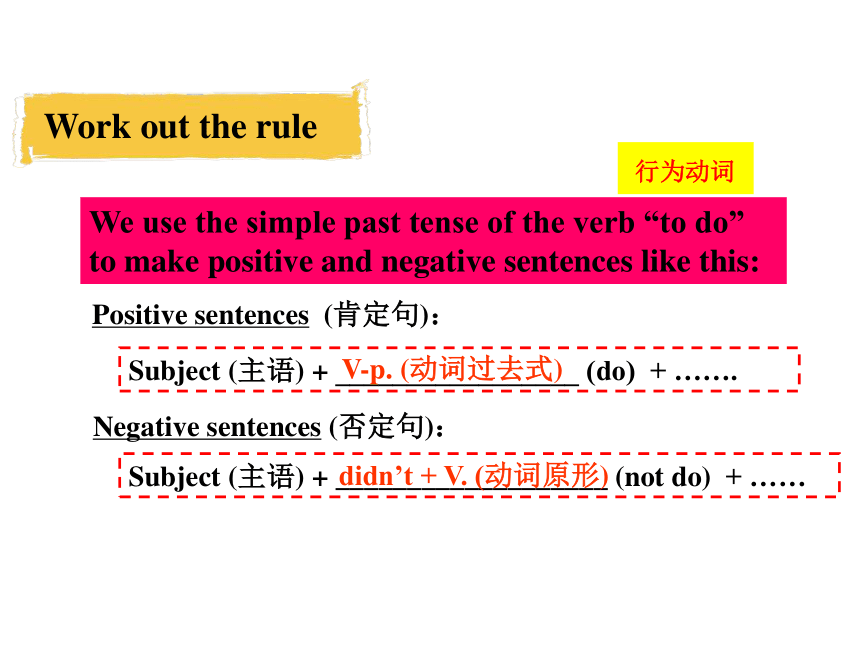
文档简介
(共31张PPT)
Unit 6 Outdoor fun
Grammar
用括号内动词的正确形式填空
A week ago, Kitty and Ben _________ (be) in the countryside. At first, the wind _________ (blow) lightly. They ________ (fly) their kite happily in the gentle breeze. Suddenly, the wind ________ (become) stronger. The clouds in the sky _______ (move) quickly. Leaves ________ (fall) from trees. The string on Ben’s kite _________ (break). The sky became dark. Kitty and Ben ________ (go ) home immediately. Kitty and Ben ________ (stay) at home. They __________ (watch) TV. The wind became much stronger. It became a typhoon. Ships and boats sank in the big waves. The typhoon _______ (pass) quickly. The wind became gentler. The big clean-up ________ (begin) immediately(立即). Kitty and Ben went outside again.
were
blew
flew
became
moved
fell
broke
went
stayed
watched
passed
began
句型转换。
1. She hears a sound. (用过去时改写此句)
She _______ a sound.
2. Daniel was born on Sunday morning. (改为否定句)
Daniel _______ born on Sunday morning.
3. She had breakfast yesterday. (改为否定句)
She ________ _________ breakfast yesterday.
4. Children played football last week. (改为一般疑问句并作否定回答)
__________ children ________ football last week
__________, ________ ____________.
heard
wasn’t
didn’t have
Did play
No they didn’t
see
find
take
hear
tell
saw
passed
noticed
jumped
found
tried
took
heard
was/were
told
Simple past tense
notice
pass
jump
try
be
Past forms of verbs
Irregular verbs
Regular verbs
Review
规则动词过去式的构成
构成规则
例词
2. 结尾是e的动词加-d
一般在动词原形末尾加-ed
notice noticed
pass passed
4. 末尾只有一个辅音字母的重读
闭音节词,先双写这个辅音字母,
再加-ed
try tried
3. 结尾是“辅音字母+y”的动词,
先变y为i,再加-ed
stop stopped
Review
一般过去时常用时间状语
Brainstorm
yesterday
last
ago
yesterday morning/afternoon/evening …
last night/month/week/year/Tuesday/term …
two days ago/a week ago/three years ago/a few minutes ago …
just now = a moment ago
in + 过去的时间
in 1990/2008
the day before yesterday
Positive sentences(肯定句)
Negative sentences(否定句)
Yes-no questions
(一般疑问句)
Three forms of Simple Past Tense
I was happy most of the time.
I read three books during the winter holiday.
I did some exercise every day.
Positive sentences
(肯定句)
I was not an early bird.
I didn’t go to Chengdu because of the Novel Coronavirus.
Negative sentences
(否定句)
to be (be 动词)
to do (行为动词)
Positive sentences
(肯定句)
Negative sentences
(否定句)
How to change
*I was happy most of the time.
*I was not happy most of the time.
wasn’t = was not
weren’t = were not
*People in Wuhan were not happy all the time.
*People in Wuhan were happy all the time.
wasn’t
weren’t
Sentences with “to be”
Positive sentences (肯定句):
Subject (主语) + ________ (be) + …….
Negative sentences (否定句):
Subject (主语) + _______________ (not be) + ……
be 动词
was/were
wasn’t/weren’t
We use the simple past tense of the verb “to be”
to make positive and negative sentences like this:
Work out the rule
Positive sentences
(肯定句)
Negative sentences
(否定句)
How to change
wasn’t = was not
weren’t= were not
I did some exercise every day.
I didn’t do any exercise every day.
I didn’t did any exercise every day.
didn’t = did not
Sentences with “to do”
past form
base form
Positive sentences (肯定句):
Subject (主语) + _________________ (do) + …….
Negative sentences (否定句):
Subject (主语) + ___________________ (not do) + ……
行为动词
V-p. (动词过去式)
didn’t + V. (动词原形)
We use the simple past tense of the verb “to do”
to make positive and negative sentences like this:
Work out the rule
It was sunny.
We were at home last Sunday.
He cleaned his room last week.
They had a spring camping last weekend.
We were not/weren’t at home last Sunday.
He did not/didn’t clean his room last week.
They did not/didn’t have a spring camping last weekend.
It was not/wasn’t sunny.
Practise
Change the sentences into negative ones.
Was she happy
Yes, she was.
No, she wasn’t.
Have a guess
Was he at school
Yes, he was.
No, he wasn’t.
Have a guess
Were they at home
Yes, they were.
No, they weren’t.
Have a guess
She was happy.
Was she happy
Were they at home
They were at home.
Positive sentences
(肯定句)
Short answers
Yes-no questions
(疑问句)
Yes, she was.
No, she wasn’t.
Yes, they were.
No, they weren’t.
Questions with “to be”
_____ (be) + Subject (主语) + …?
Yes, Subject + ____________ (be).
No, Subject + ______________ (be).
be 动词
We use the simple past tense of the verb “to be” to ask and answer questions like this:
Work out the rule
Was/Were
was/were
wasn’t/weren’t
Questions with “to do”
Did Millie go to the zoo yesterday
No, she didn’t.
Did Millie visit the park yesterday
Yes, she did.
Millie went to the zoo yesterday.
Did Millie go to the zoo yesterday
Positive sentences
(肯定句)
Short answers
Yes-no questions
(疑问句)
Yes, she did. / No, she didn’t.
Questions with “to do”
past form
base form
__ + Subject (主语) + ____ (do) + ...?
Yes , Subject (主语) + __.
No , Subject (主语) + ___.
行为 动词
We use the simple past tense of the verb “to do” to ask and answer questions like this:
Work out the rule
Did
did
didn’t
V(动词原形)
He was late for school yesterday morning. (否定句)
2. There was some bread on the table just now.
(一般疑问句,并作肯定回答)
3. The twins were born in 2000. (一般疑问句,并作否定回答)
He wasn’t late for school yesterday morning.
Was there any bread on the table just now
Yes, there was.
Were the twins born in 2000
No, they weren’t.
Practise
对画线部分提问
1. She stayed there for a week.
______ ______ _____ she _____ there
2. They went to the park by bus.
_____ _____ they _____ to the park
3. Mary cleaned the house last weekend.
________________________________________
4. The students raised some money for Project Hope.
_________________________________________
How
long
did
stay
How
did
go
What did Mary clean last weekend
What did the students do for Project Hope
Practise
Yesterday was Sunday. I visited the park and had a good time. Simon did not play football. He practised playing volleyball with his friend. Kitty likes shopping. She did some shopping with her mum yesterday afternoon. Daniel did not go out yesterday. He stayed at home and read some books.
Millie’s weekend (Page 74)
Complete Sandy and Simon’s conversation
Sandy: ________ you and your family _______ (go) camping
last week
Simon: No, we ________. We ________ (go) camping last
month.
Sandy: ________ (be) it interesting
Simon: Yes, it _________.
Sandy: What ________ you ________ (do) there
Simon: We _________ (put) up our tent near a lake. My cousin
Annie and I _______ (be) very happy. We also _______
(row) a boat on the lake.
Sandy: _______ you ________ (stay) outside all night
Simon: Yes, we _________. The camping trip _______ (be)
really wonderful.
Did
go
didn’t
went
Was
was
did
do
put
were
rowed
Did
stay
did
was
Conclusion
一般疑问句:
Was/Were…
Did … do…
回答:
Yes, … was. / Yes, … were.
No, … wasn’t. / No,… weren’t.
Yes, … did. / No, … didn’t.
特殊疑问句:
疑问词 + was/were …
疑问词 + did … do …
否定句:
wasn’t/weren’t
didn’t do
一般过去时
1. Mr. Black is going to marry a girl he
______ in Japan last year.
A. meets B. met
C. has met D. would meet
2. — Do you know who cleaned the
blackboard, Tina
— Yes. John ______.
A. do B. does C. did
I. 选择正确答案。
Consolidation
3. — What did Mr. Smith do before he
came to China
— He ______ in a car factory.
A. works B. worked
C. is working D. will work
4. Hello! I'm very glad to see you. When
______ you ______ here
A. did; arrive B. will; arrive
C. have; arrived D. are; arriving
5. Paul and I ______ tennis yesterday. He
did much better than I.
A. play B. will play
C. played D. are playing
6. — Where were you last Saturday
— I ____ in the Capital Museum.
A. am B. will be
C. was D. have been
1. Lucy did her homework at home.
(否定句)
Lucy _______ _____ her homework
at home.
2. He found some meat in the fridge.
(一般疑问句)
______ he _____ ______ meat in the
fridge
didn’t
do
any
find
Did
II. 改写句子。
3. She stayed there for a week.
(划线部分提问)
_____ _____ ____ she _____ there
4. There was some orange juice in the
cup. (一般疑问句)
_____ there _____ orange juice in the
cup
stay
did
long
How
any
Was
Unit 6 Outdoor fun
Grammar
用括号内动词的正确形式填空
A week ago, Kitty and Ben _________ (be) in the countryside. At first, the wind _________ (blow) lightly. They ________ (fly) their kite happily in the gentle breeze. Suddenly, the wind ________ (become) stronger. The clouds in the sky _______ (move) quickly. Leaves ________ (fall) from trees. The string on Ben’s kite _________ (break). The sky became dark. Kitty and Ben ________ (go ) home immediately. Kitty and Ben ________ (stay) at home. They __________ (watch) TV. The wind became much stronger. It became a typhoon. Ships and boats sank in the big waves. The typhoon _______ (pass) quickly. The wind became gentler. The big clean-up ________ (begin) immediately(立即). Kitty and Ben went outside again.
were
blew
flew
became
moved
fell
broke
went
stayed
watched
passed
began
句型转换。
1. She hears a sound. (用过去时改写此句)
She _______ a sound.
2. Daniel was born on Sunday morning. (改为否定句)
Daniel _______ born on Sunday morning.
3. She had breakfast yesterday. (改为否定句)
She ________ _________ breakfast yesterday.
4. Children played football last week. (改为一般疑问句并作否定回答)
__________ children ________ football last week
__________, ________ ____________.
heard
wasn’t
didn’t have
Did play
No they didn’t
see
find
take
hear
tell
saw
passed
noticed
jumped
found
tried
took
heard
was/were
told
Simple past tense
notice
pass
jump
try
be
Past forms of verbs
Irregular verbs
Regular verbs
Review
规则动词过去式的构成
构成规则
例词
2. 结尾是e的动词加-d
一般在动词原形末尾加-ed
notice noticed
pass passed
4. 末尾只有一个辅音字母的重读
闭音节词,先双写这个辅音字母,
再加-ed
try tried
3. 结尾是“辅音字母+y”的动词,
先变y为i,再加-ed
stop stopped
Review
一般过去时常用时间状语
Brainstorm
yesterday
last
ago
yesterday morning/afternoon/evening …
last night/month/week/year/Tuesday/term …
two days ago/a week ago/three years ago/a few minutes ago …
just now = a moment ago
in + 过去的时间
in 1990/2008
the day before yesterday
Positive sentences(肯定句)
Negative sentences(否定句)
Yes-no questions
(一般疑问句)
Three forms of Simple Past Tense
I was happy most of the time.
I read three books during the winter holiday.
I did some exercise every day.
Positive sentences
(肯定句)
I was not an early bird.
I didn’t go to Chengdu because of the Novel Coronavirus.
Negative sentences
(否定句)
to be (be 动词)
to do (行为动词)
Positive sentences
(肯定句)
Negative sentences
(否定句)
How to change
*I was happy most of the time.
*I was not happy most of the time.
wasn’t = was not
weren’t = were not
*People in Wuhan were not happy all the time.
*People in Wuhan were happy all the time.
wasn’t
weren’t
Sentences with “to be”
Positive sentences (肯定句):
Subject (主语) + ________ (be) + …….
Negative sentences (否定句):
Subject (主语) + _______________ (not be) + ……
be 动词
was/were
wasn’t/weren’t
We use the simple past tense of the verb “to be”
to make positive and negative sentences like this:
Work out the rule
Positive sentences
(肯定句)
Negative sentences
(否定句)
How to change
wasn’t = was not
weren’t= were not
I did some exercise every day.
I didn’t do any exercise every day.
I didn’t did any exercise every day.
didn’t = did not
Sentences with “to do”
past form
base form
Positive sentences (肯定句):
Subject (主语) + _________________ (do) + …….
Negative sentences (否定句):
Subject (主语) + ___________________ (not do) + ……
行为动词
V-p. (动词过去式)
didn’t + V. (动词原形)
We use the simple past tense of the verb “to do”
to make positive and negative sentences like this:
Work out the rule
It was sunny.
We were at home last Sunday.
He cleaned his room last week.
They had a spring camping last weekend.
We were not/weren’t at home last Sunday.
He did not/didn’t clean his room last week.
They did not/didn’t have a spring camping last weekend.
It was not/wasn’t sunny.
Practise
Change the sentences into negative ones.
Was she happy
Yes, she was.
No, she wasn’t.
Have a guess
Was he at school
Yes, he was.
No, he wasn’t.
Have a guess
Were they at home
Yes, they were.
No, they weren’t.
Have a guess
She was happy.
Was she happy
Were they at home
They were at home.
Positive sentences
(肯定句)
Short answers
Yes-no questions
(疑问句)
Yes, she was.
No, she wasn’t.
Yes, they were.
No, they weren’t.
Questions with “to be”
_____ (be) + Subject (主语) + …?
Yes, Subject + ____________ (be).
No, Subject + ______________ (be).
be 动词
We use the simple past tense of the verb “to be” to ask and answer questions like this:
Work out the rule
Was/Were
was/were
wasn’t/weren’t
Questions with “to do”
Did Millie go to the zoo yesterday
No, she didn’t.
Did Millie visit the park yesterday
Yes, she did.
Millie went to the zoo yesterday.
Did Millie go to the zoo yesterday
Positive sentences
(肯定句)
Short answers
Yes-no questions
(疑问句)
Yes, she did. / No, she didn’t.
Questions with “to do”
past form
base form
__ + Subject (主语) + ____ (do) + ...?
Yes , Subject (主语) + __.
No , Subject (主语) + ___.
行为 动词
We use the simple past tense of the verb “to do” to ask and answer questions like this:
Work out the rule
Did
did
didn’t
V(动词原形)
He was late for school yesterday morning. (否定句)
2. There was some bread on the table just now.
(一般疑问句,并作肯定回答)
3. The twins were born in 2000. (一般疑问句,并作否定回答)
He wasn’t late for school yesterday morning.
Was there any bread on the table just now
Yes, there was.
Were the twins born in 2000
No, they weren’t.
Practise
对画线部分提问
1. She stayed there for a week.
______ ______ _____ she _____ there
2. They went to the park by bus.
_____ _____ they _____ to the park
3. Mary cleaned the house last weekend.
________________________________________
4. The students raised some money for Project Hope.
_________________________________________
How
long
did
stay
How
did
go
What did Mary clean last weekend
What did the students do for Project Hope
Practise
Yesterday was Sunday. I visited the park and had a good time. Simon did not play football. He practised playing volleyball with his friend. Kitty likes shopping. She did some shopping with her mum yesterday afternoon. Daniel did not go out yesterday. He stayed at home and read some books.
Millie’s weekend (Page 74)
Complete Sandy and Simon’s conversation
Sandy: ________ you and your family _______ (go) camping
last week
Simon: No, we ________. We ________ (go) camping last
month.
Sandy: ________ (be) it interesting
Simon: Yes, it _________.
Sandy: What ________ you ________ (do) there
Simon: We _________ (put) up our tent near a lake. My cousin
Annie and I _______ (be) very happy. We also _______
(row) a boat on the lake.
Sandy: _______ you ________ (stay) outside all night
Simon: Yes, we _________. The camping trip _______ (be)
really wonderful.
Did
go
didn’t
went
Was
was
did
do
put
were
rowed
Did
stay
did
was
Conclusion
一般疑问句:
Was/Were…
Did … do…
回答:
Yes, … was. / Yes, … were.
No, … wasn’t. / No,… weren’t.
Yes, … did. / No, … didn’t.
特殊疑问句:
疑问词 + was/were …
疑问词 + did … do …
否定句:
wasn’t/weren’t
didn’t do
一般过去时
1. Mr. Black is going to marry a girl he
______ in Japan last year.
A. meets B. met
C. has met D. would meet
2. — Do you know who cleaned the
blackboard, Tina
— Yes. John ______.
A. do B. does C. did
I. 选择正确答案。
Consolidation
3. — What did Mr. Smith do before he
came to China
— He ______ in a car factory.
A. works B. worked
C. is working D. will work
4. Hello! I'm very glad to see you. When
______ you ______ here
A. did; arrive B. will; arrive
C. have; arrived D. are; arriving
5. Paul and I ______ tennis yesterday. He
did much better than I.
A. play B. will play
C. played D. are playing
6. — Where were you last Saturday
— I ____ in the Capital Museum.
A. am B. will be
C. was D. have been
1. Lucy did her homework at home.
(否定句)
Lucy _______ _____ her homework
at home.
2. He found some meat in the fridge.
(一般疑问句)
______ he _____ ______ meat in the
fridge
didn’t
do
any
find
Did
II. 改写句子。
3. She stayed there for a week.
(划线部分提问)
_____ _____ ____ she _____ there
4. There was some orange juice in the
cup. (一般疑问句)
_____ there _____ orange juice in the
cup
stay
did
long
How
any
Was
